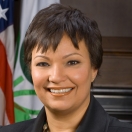
Each year when Earth Day rolls around, we’re given an opportunity to reflect on how far we’ve come in protecting the health and the environment of our communities. This Earth Day, EPA under President Obama's leadership is proud of all the progress we’ve made in just two years to protect the air we breathe, the water we drink and swim in, and the communities where we build our homes, schools and businesses.
In protecting our air, we’ve marked some historic “firsts”: setting the first joint fuel efficiency and emissions standards with the Department of Transportation that will make American cars and trucks more fuel efficient than ever before, as well as establishing the first new standards for sulfur dioxide in forty years.
And just last month, we set another first: the first national standards for mercury, arsenic and other air pollution from our nation’s power plants. These standards require power plants to use proven pollution control technology at their facilities, a change that will help prevent as many as 17,000 premature deaths and 11,000 heart attacks a year. For our young people, the new standards will help prevent 120,000 incidents of asthma symptoms and about 11,000 fewer cases of acute bronchitis among children.
We’ve also taken major steps to revitalize America’s waters. The Great Lakes Restoration Initiative is setting a new standard of care for the source of 95 percent of America’s surface freshwater. On the Chesapeake Bay, historic efforts are underway to protect waters that touch the lives and livelihoods of 17 million people. And one year after the Deepwater Horizon BP spill that hit the Gulf Coast and my home state of Louisiana so hard, the Gulf Coast Ecosystem Restoration Task Force, which the president asked me to chair, is developing a plan – not just to continue the important recovery from the largest oil spill in U.S. history, but to take on issues that have plagued the region for years. All that is happening at the same time we are collaborating with local communities to revitalize urban waterways, working with schools and small businesses to lead the world in the next generation of clean water technology, and helping communities put in place green infrastructure and other cost-effective tools that work with mother nature to filter and reduce pollution.
As we protect the water that flows through our communities, we’re also protecting the ground these communities are built on. We’ve been cleaning up communities through swift implementation of the president’s Recovery Act, which funded Brownfields and Superfund cleanups across the nation. To make certain every community – including low-income and minority communities that often face disproportionate environmental challenges – have a seat at the table, we’ve stepped up to expand the conversation on environmentalism. We've revitalized our Environmental Justice office at EPA, issued agency-wide guidance on incorporating environmental justice into our decision making and, with my good friend Nancy Sutley, Chair of the president’s Council for Environmental Quality, reconvened the leadership of the Interagency Working Group on Environmental Justice for the first time in over a decade.
Our outreach has not stopped there. We've spoken to farmers, clean energy innovators, clergy, teachers, students and environmental entrepreneurs. I've also been able to keep in touch with the next generation of leaders by achieving yet another "first": the first EPA Administrator with a Facebook page and a Twitter feed. Today there are voices calling for protecting our health and our environment that were not part of this discussion two years ago. They know that this EPA serves them. They know that their concerns are our concerns. And they know that we’re going to make sure all Americans get the protections and opportunities they need and deserve.
These are just a few examples of our efforts over the last two years. We’ve come a long way, but still have a long way to go to strengthen protections for American families, foster more innovation and safeguard the environment we will leave to our children and grandchildren.
Lisa P. Jackson is the Administrator of the Environmental Protection Agency


